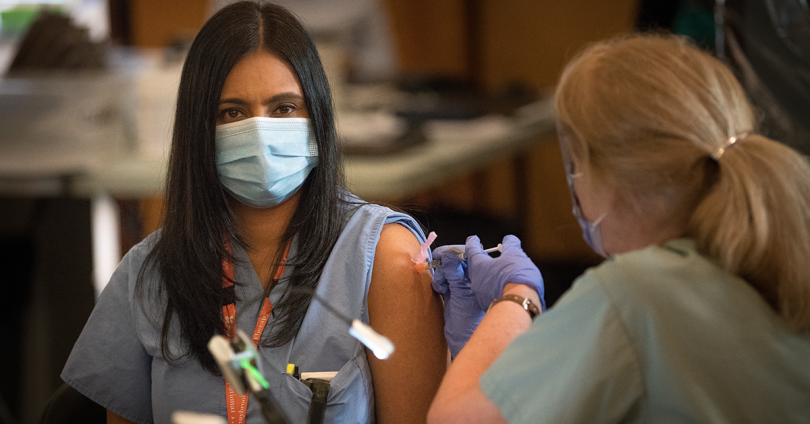Pictured: Sunnybrook occupational therapist Tanya Abji receives a dose of the COVID-19 vaccine. “It’s been a very tough year working here, trying to protect ourselves and trying to protect other people and so I feel like now, hopefully with this, we can protect ourselves and other people going forward,” she says. “I really encourage you, people who are hesitant, to do research, ask questions, get educated and make an informed decision about getting the vaccine.”
As the vaccine rollout continues in Ontario, Sunnybrook has not only been vaccinating staff and community members, but also working hard to provide people with accurate information about the safety and effectiveness of the vaccines.
Dr. Adina Weinerman is the medical director of quality and patient safety at Sunnybrook and is one of the team members helping staff make informed decisions about vaccination. She shares some important information about the effectiveness of the COVID-19 vaccines, addresses concerns about the risk of blood clots and the importance of making an informed decision about whether to get vaccinated.
All the approved vaccines are effective
Dr. Weinerman says all the vaccines currently approved by Health Canada are effective at combatting the COVID-19 virus.
“(They) all do a great job of significantly decreasing an individual’s likelihood of getting infected with COVID,” she says, adding even if a vaccinated individual contracts COVID, the vaccine “has been shown to significantly minimize the impact of the illness on that person so they are much more likely to get a mild version of the infection.”
Dr. Weinerman says it’s not worth the risk to wait for a preferred vaccine because the time spent waiting increases the chances of getting COVID.
“And you’re waiting for a miniscule difference between effectiveness.”
Putting the risk of blood clots into perspective
In recent weeks, there have been reports of blood clots in some individuals who received the Astra-Zeneca or Johnson & Johnson vaccines. Dr. Weinerman says while she understands reports such as these can cause concern for people, Health Canada’s response should offer some reassurance as well.
“(The) regulatory and scientific bodies that are overseeing the vaccine rollout are paying close attention to … any type of potential risk associated with the vaccine. And they are acting out of an abundance of caution to make sure that the vaccines are safe.”
As for the risk of blood clots, Dr. Weinerman says it’s important to weigh the risks and benefits.
“With COVID, you have a much higher risk of getting a very serious blood clot, way higher than the risks of blood clots with either of those vaccines, in addition to all the other poor outcomes of getting COVID,” she says.
Get vaccine information from credible sources
If you, your family members or friends have questions about vaccines, Dr. Weinerman says it’s important to find credible information.
Good sources of information can be government or scientific websites, but as long as people verify a source is reliable, accurate information can also be found on social media sites such as Facebook or Twitter.
“You have to still make sure that it is based on facts,” she says.
Dr. Weinerman says a family doctor is also a great resource for vaccine-related concerns and questions.
Vaccination is the best defense against COVID-19
Even for those people who think they may be unlikely to contract COVID or end up hospitalized because of it, Dr. Weinerman says it’s important to consider getting vaccinated.
“We are clearly seeing that the new variants are more transmissible, cause more morbidity and … that it’s impacting younger people,” she says, adding even if an individual doesn’t experience a severe case of COVID-19, they could transmit it to a loved one who could be more vulnerable.
“These are really good vaccines,” says Dr. Weinerman. “To protect yourself, your family, the hospital, your community, it’s just so important to consider getting vaccinated.”
And, even after being vaccinated, continue to follow Public Health guidelines for wearing a mask, washing hands and keeping physical distance.
Watch: Sunnybrook staff share why they chose to get the COVID-19 vaccine
Trusted vaccine resources
- Sunnybrook.ca/vaccine
- Pregnancy, fertility and the COVID-19 vaccine: Q&A with Sunnybrook experts
- Toronto Public Health – COVID-19 vaccines
- Government of Ontario – COVID-19 vaccine safety
- Public Health Agency of Canada – COVID-19: How vaccines are developed
- Government of Canada – Information on COVID-19 vaccines approved for use in Canada








